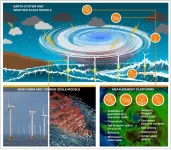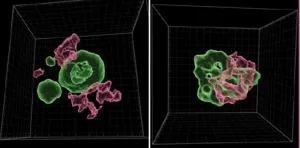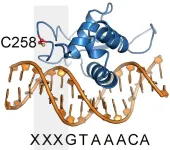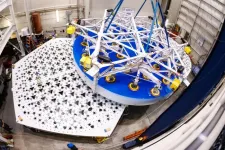(Press-News.org) In 2019, Raymond Mailhot was visiting with a young patient and his family facing a scary diagnosis – brain cancer. Treatments were incredibly effective, and the young boy was going to survive, Mailhot shared in Spanish with the Venezuelan immigrants.
But life would be disrupted at home, at the hospital, and at school, likely for months, he said.
“His story really made me want to dig deeper into the scholastic performance of survivors,” said Mailhot, M.D., M.P.H, an associate professor of radiation oncology at the University of Florida. “We discovered that survivors had twice the odds of being held back and performed significantly worse on state testing in math compared to their peers.”
Survivors were also 21 times more likely to receive accommodations at school, such as help taking tests, in addition to their worse test performance and greater chance of having to repeat a grade.
Although rare, brain cancer is the most common type of solid tumor faced by children. Advanced treatments mean the vast majority of patients survive. But the disruption of therapy and the direct effects of treatment on the brain lead to cognitive deficits in most survivors.
However, little was known about how these cognitive effects translated to school success in the real world. So Mailhot collaborated with colleagues in UF’s College of Medicine and College of Education to investigate survivors’ performance.
With financial support from the Florida Department of Health and educational records provided by the state’s Department of Education, the researchers were able measure educational outcomes in former patients and fellow students from the same district and economic status, who served as controls in the study. With access to records from both before and after patients’ cancer diagnoses, the team could better see the effects of treatment and time spent away from school.
“Everyone wants these children to succeed – caregivers, clinicians and educators,” said Mailhot, who treats patients at UF Health’s Proton Therapy Institute in Jacksonville. “If we’re able to better report on the challenges these children face in school, we can be more intentional about understanding what curricular resources may be needed for every child to be successful.”
The researchers published their findings Sept. 19 in the International Journal of Radiation Oncology.
END
Survivors of childhood brain cancer are more likely to be held back in school
2024-10-15
ELSE PRESS RELEASES FROM THIS DATE:
Updating offshore turbine designs to reflect storms’ complexity is key
2024-10-15
WASHINGTON, Oct. 15, 2024 – The U.S. is ramping up plans for a major increase in offshore wind production, with 30 gigawatts of new installations expected by 2030 and a total of 110 gigawatts by 2050. But to be successful, the country needs to design turbines that can withstand the challenges of tropical storms.
“Extreme weather impacts on offshore wind turbines are not fully understood by the industry,” author Jiali Wang said. “Manufacturers design wind turbines based on international design standards, but better models and data are needed to study the impacts of extreme weather ...
Hospital strain during the COVID-19 pandemic and outcomes in older racial and ethnic minority adults
2024-10-15
About The Study: In this cross-sectional study, older adults hospitalized with sepsis were more likely to die or experience major morbidity as the hospital COVID-19 burden increased. These increases in adverse outcomes were greater in magnitude among members of minority populations than for white individuals.
Corresponding Author: To contact the corresponding author, Laurent G. Glance, MD, email laurent_glance@urmc.rochester.edu.
To access the embargoed study: Visit our For The Media website at this link https://media.jamanetwork.com/
(doi:10.1001/jamanetworkopen.2024.38563)
Editor’s Note: Please see the article for additional information, ...
Scientists unveils key role of “selfish DNA” in early human development
2024-10-15
A critical transition in early human development is regulated not by our own genes, but by DNA elements called transposons that can move around the genome, Sinai Health researchers have found.
This remarkable discovery challenges our previous understanding of these elusive DNA segments, shedding new light on the roles they play in human development and disease.
“People tend to think of transposons as akin to viruses where they hijack our cells for the sole purpose of propagating themselves,” says study’s senior co-author Dr. Miguel Ramalho-Santos, Senior Investigator at the Lunenfeld-Tanenbaum Research Institute (LTRI), part of Sinai Health, and Professor ...
Bonobos may be more vulnerable than previously thought, suggests genetics study
2024-10-15
Bonobos, endangered great apes that are among our closest relatives, might be more vulnerable than previously understood, finds a genetics study led by a UCL researcher that reveals three distinct populations.
The three groups of bonobos have been living separately in different regions in Central Africa for tens of thousands of years, according to the study published in Current Biology by an international research team co-led by UCL, University of Vienna, and Max Planck Institute for Evolutionary Anthropology ...
Scripps Research scientists discover chemical probes for previously “undruggable” cancer target
2024-10-15
LA JOLLA, CA—Hormone-driven cancers, like those of the breast and prostate, often rely on a tricky-to-target protein called Forkhead box protein 1 (FOXA1). FOXA1 mutations can enable these types of cancers to grow and proliferate. Today, FOXA1 is notoriously difficult to block with drugs—but that may soon change.
Scripps Research scientists have identified a crucial binding site on FOXA1 that could pave the way for future cancer treatments. The team’s findings, which were published in Molecular Cell on October 15, 2024, also mapped out how tiny drug-like chemical compounds—called small molecules—interact with the protein.
While ...
Giant Magellan telescope begins primary mirror support system testing
2024-10-15
TUCSON, AZ — October 15, 2024 — The Giant Magellan Telescope today announced the successful installation of one of its completed 8.4-meter-diameter primary mirrors into a support system prototype at the University of Arizona’s Richard F. Caris Mirror Lab. This highly sophisticated system — comparable in size to half a basketball court and containing three times the number of parts of a typical car — is vital to the telescope’s optical performance and precision control. The milestone marks the start of a six-month optical testing phase to demonstrate that the support system can control the mirror as required, validating the revolutionary capabilities ...
Experimental cancer drug eliminates bone metastases caused by breast cancer in lab models
2024-10-15
In a new study led by Johns Hopkins Medicine, the drug RK-33 has demonstrated promise in treating breast cancer that has spread to the bone (breast cancer bone metastasis). RK-33 was previously shown to help treat other types of cancer and viral illnesses.
Patients with breast cancer and bone metastasis have limited treatment options and often rely on palliative care to ease difficult symptoms, including frailty and pain. In most cases, breast cancer with bone metastasis is incurable.
Now, corresponding author Venu Raman, Ph.D., ...
Political candidates who fight climate change stand to benefit in election
2024-10-15
A majority of Floridians expressed support for political candidates who fight climate change in a new Florida Atlantic University survey. The survey found that nearly 52% of respondents agreed that a candidate with a record of reducing climate impacts was more likely to get their vote.
The Invading Sea’s Florida Climate Survey also revealed strong support in the state for increasing renewable energy use and teaching climate science in K-12 classrooms. The survey is the 11th conducted by the FAU Center for Environmental Studies ...
Stand up to Cancer announces new grants supporting pioneering research in six cancer types
2024-10-15
LOS ANGELES – Oct. 15, 2024 – Stand Up To Cancer® (SU2C) today announced grants to several teams of leading cancer investigators in support of cutting-edge research in a variety of cancers including head and neck, pediatric, pancreatic, breast, rectal and gastro-esophageal cancers, as well as research focused on how the microbiome communicates with the immune system.
“These new grants emphasize SU2C’s support of collaborative, trailblazing research that pushes the field forward and helps people impacted by some of the most common or difficult-to-treat cancers,” said Julian Adams, Ph.D., president and CEO of SU2C. “With an emphasis on answering ...
Researchers awarded $1.3M to help military Veterans battling Acute Myeloid Leukemia
2024-10-15
CLEVELAND—With a new four-year, $1.3 million grant from the U.S. Department of Veterans Affairs, researchers at Case Western Reserve University are investigating a new approach to treat Acute Myeloid Leukemia (AML) in military Veterans.
AML is the most common form of blood cancer in adults, and many patients suffer relapses—especially Veterans, due to exposure to harmful chemicals and radiation during active duty, according to the National Center for Biotechnology Information.
There is no effective treatment for AML and, according to the National Institutes of Health, half of treated patients suffer a relapse after therapy—mainly ...







